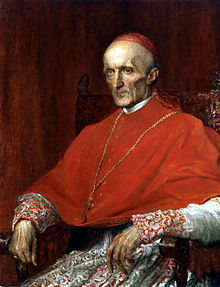Henry Edward Manning
Appearance

The Most Reverend Dr Henry Edward Cardinal Manning (15 July 1808 – 14 January 1892) was an English Roman Catholic Archbishop of Westminster and a cardinal.
Quotes
[edit]- God knows that I would rather stand in the lowest place within the Truth, than in the highest without it. Nay, outside the Truth the higher the worse. It is only so much more opposition to Truth, so much more propagation of falsehood.
- Letter to Robert Wilberforce (Rome, 15 February 1848); in Edmund Sheridan Purcell, Life of Cardinal Manning, Vol. I (London: Macmillan and Co., 1896), p. 513.
- No ignorance of truth is a personal sin before God, except that ignorance which springs from personal sin.
- Sermons (London: William Pickering, 1850), Vol. 4, Sermon IV: "Christ Preached in Any Way a Cause of Joy", p. 76
- Our character is our will; for what we will we are.
- Sermons (London: William Pickering, 1850), Vol. 4, Sermon XXI: "Life Everlasting", p. 360.
- Now it is certain, by the voice of all mankind, that God speaks to us through His works—that He whispers to us through our natural conscience—that He attracts us to Him by instincts, and desires, and aspirations after a happiness higher than sense, and more enduring, more changeless, than this mortal life. God speaks to us articulately in the stirring life of nature, and in the silence of our own being.
- The Temporal Mission of the Holy Ghost, or Reason and Revelation (London: Longmans, Green, and Co., 1865), pp. 11–12.
- What is dogma but the intellectual conception and verbal expression of a divine truth?
- The Temporal Mission of the Holy Ghost, or Reason and Revelation (London: Longmans, Green, and Co., 1865), p. 234.
- As a dogma, theologians teach that many belong to the Church who are out of its visible unity; as a moral truth that to be out of the Church is no personal sin, except to those who sin in being out of it. That is, they will be lost, not because they are geographically out of it, but because they are culpably out of it.
- England and Christendom (London: Longmans, Green, and Co., 1867), p. 95.
- There are only two centres, God and ourselves; and we must rest on one or on the other.
- Sin and Its Consequences (London: Burns and Oates, 1874), p. 254.
- Praise consists in the love of God, in wonder at the goodness of God, in recognition of the gifts of God, in seeing God in all things He gives us, ay, and even in the things that He refuses to us; so as to see our whole life in the light of God; and seeing this, to bless Him, adore Him, and glorify Him.
- Sin and Its Consequences (London: Burns and Oates, 1874), p. 256.
- Twenty errors in practice are as nothing compared with one error in principle. Twenty errors in practice may be corrected, and the twenty-first may never be committed; but one erroneous principle is like a damaged wheel in a machine. It can never work correctly afterwards. One speculative error will produce an infinite series of practical errors. The series is inexhaustible, until the machine itself is either amended or destroyed.
- The Internal Mission of the Holy Ghost (London: Burns and Oates, 1875), p. 324.
- A necessity of my reason constrains me to believe the existence of God, because I can in no other way account for my own existence.… I know that I am. I am either uncaused, or self-caused, or caused by a cause.
- Religio Viatoris (London: Burns and Oates, 1887), p. 1.
- The softness, and the glare, and the temptations, and the licence, and the lax examples about us, are more seducing and dangerous than the winter of penal laws. They hardened the manhood of Catholic parents. The summer sun relaxes many.
- Towards Evening: Extracts from the Writings of Cardinal Manning, compiled by A. M. W. (London: Kegan Paul, Trench & Co., 1889), p. 144.
- Necessity knows no law, and the starving man has a natural right to a share of his neighbor's bread.
- quoted in Emma Goldman, written by Hippolyte Havel as an Introduction for Goldman's 1911 book Anarchism and Other Essays
- All human conflict is ultimately theological.
- In conversation with Hilaire Belloc (around 1890). Reported in Hilaire Belloc, The Cruise of the "Nona" (1925). Harmondsworth: Penguin, 1958, p. 48.
- What Manning meant, Belloc explains, is "that all wars and revolutions, and all decisive struggles between parties of men arise from a difference in moral and transcendental doctrine" (p. 48), since no man, "arguing for what should be among men, but took for granted as he argued that the doctrine he consciously or unconsciously accepted was or should be a similar foundation for all mankind. Hence battle." (p. 49)
Quotes about Manning
[edit]- In an address before the "Academia," which had been organized to combat "science falsely so called," Cardinal Manning declared his abhorrence of the new view of Nature, and described it as "a brutal philosophy—to wit, there is no God, and the ape is our Adam." …These attacks from such eminent sources set the clerical fashion for several years.
- Manning's response to Darwin's Origin of Species and to the theory of natural selection
- Andrew Dickson White, A History of the Warfare of Science with Theology in Christendom, Ch.1.
External links
[edit] Encyclopedic article on Henry Edward Manning on Wikipedia
Encyclopedic article on Henry Edward Manning on Wikipedia Media related to Henry Edward Manning on Wikimedia Commons
Media related to Henry Edward Manning on Wikimedia Commons Works related to Author:Henry Edward Manning on Wikisource
Works related to Author:Henry Edward Manning on Wikisource
